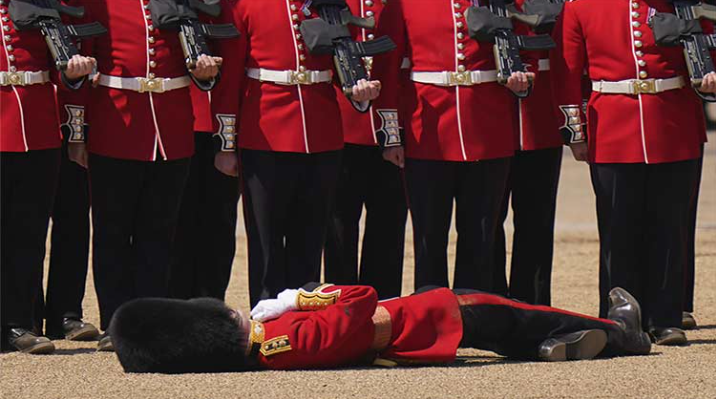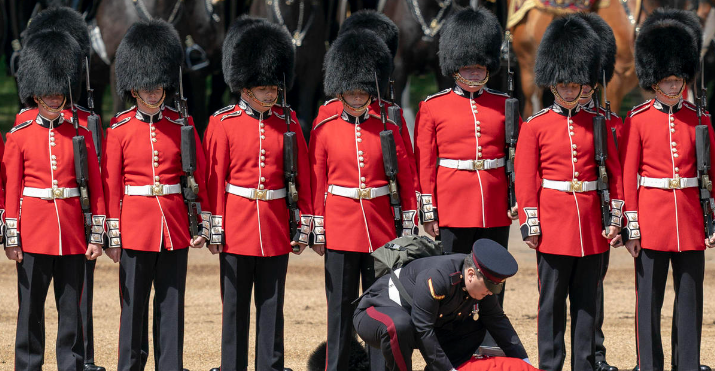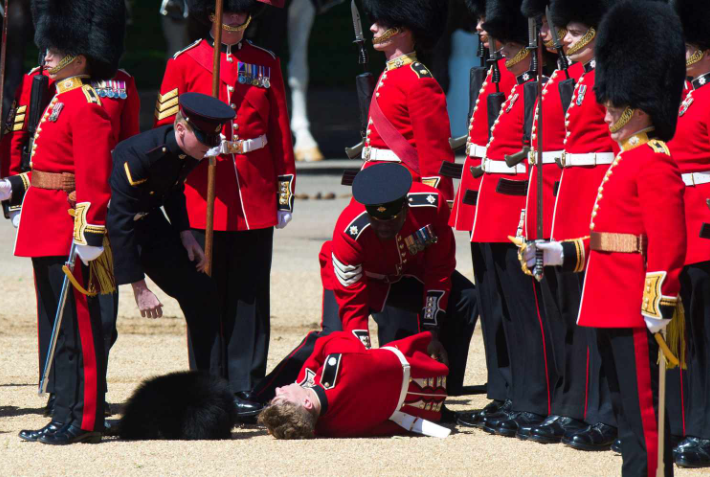Overview
The picture of the British Royal Guards Faint as unwaveringly composed soldiers occasionally gives way to an unexpected event: these recognizable individuals pass out while performing their duties. This essay aims to investigate the fundamental reasons behind these occurrences, illuminating the psychological and physical difficulties these devoted warriors endure.
1. The Demanding Physical and Training Requirements
The Discipline Crucible
A Royal Guard’s journey starts with a rigorous training program that shapes them into the pinnacle of discipline. There is a physical cost to standing for extended periods of time, especially when wearing ornate ceremonial outfits and recognizable bearskin headgear. This section explores the demanding training that prepares employees for difficulties they may encounter on the job.
The Significance of Custom
We investigate how these factors add to the occasional fainting events and the physical toll they take on the bodies of the guards by looking at the physical demands placed on Royal Guards, particularly the weight of ceremonial gear.
2. Physiological Elements Involved in Passing Out
Motionless: An Physiological Difficulty
Long periods of inactivity, especially in different climatic situations, present serious physiological difficulties. We investigate the ways that exhaustion, heat stress, and dehydration affect the guards’ health and lead to cases of fainting.
Reducing Stressors on the Physiology
This section examines the tactics used to maintain the guards’ physical well-being during their strenuous responsibilities, as well as the steps taken to offset these physiological problems.
3. The Pressure and Mental Resilience

Calm in the Face of Examine
Being a security guard at a famous place like Buckingham Palace has significant mental hurdles. There is additional pressure to maintain composure in the face of public criticism. This section examines the mental toughness needed for the job and how it relates to the sporadic episodes of fainting among Royal Guards.
Managing Stressors of the Mind
Examining the psychological facets of their work, we look at how Royal Guards manage the mental strain that comes with their prominent positions.
4. Making the Royal Guards More Human
Inside the Uniform: Individual Narratives
By revealing candid testimonies and personal tales, this part humanizes Royal Guards beneath the ceremonial uniforms. By doing this, we bring readers a clearer picture of the guards’ individual experiences.
Overcoming Perception Divides
By bridging the gap between the public’s conception of Royal Guards and the reality of their human experiences, this component seeks to promote understanding and empathy.
5. Modifications and Reductions
Changing Customs
Examining the modifications and alterations brought about in reaction to episodes of fainting, we talk about changes to duty schedules, enhancements to uniform design, and continuous attempts to find a balance between tradition and the welfare of the Royal Guards.
6. Public Opinion and Media Coverage
This section explores the ways in which British Royal Guards’ experiences are shaped by public opinion and media attention. The mental health of guards can be greatly impacted by public expectations and media coverage, which can raise their stress levels and add to the difficulties they encounter on the job. We investigate the dynamic interaction that exists between the guards’ iconic persona and the public and media’s perception of them.
7. Joint Ventures: Security Officers and Law Enforcement

This section highlights the collaborative relationship between the Royal Guards and the agencies overseeing their welfare. The opinions and involvement of the guards are very important in determining how to handle fainting episodes. We examine the steps that authorities and guards have made to strike a healthy balance between custom and the physical and mental well-being of the guards, assuring a process of constant improvement in the procedures and customs related to their responsibilities.
Addressing Mental Health Concerns
Counseling Services:
Royal Guards have access to confidential counseling services provided by trained professionals to address mental health issues and offer psychological support.
Stress Management Programs:
Specialized stress management programs are implemented to equip guards with coping mechanisms and resilience-building techniques to manage the pressures of their duties effectively.
Awareness Campaigns:
Public awareness campaigns are conducted to destigmatize mental health discussions and encourage guards to seek help when needed. These campaigns promote open dialogue and provide information about available resources.
Enhancing Public Perception and Understanding
Educational Campaigns:
Educational initiatives are launched to provide insights into the rigorous training, physical demands, and mental challenges faced by Royal Guards. These campaigns aim to dispel misconceptions and foster a deeper appreciation for the guards’ dedication and sacrifices.
Public Outreach Events:
Public outreach events, such as meet-and-greet sessions and guided tours, allow the public to interact with Royal Guards on a personal level and gain a better understanding of their roles and responsibilities.
Media Engagement:
Strategic media engagement efforts involve sharing personal stories and experiences of Royal Guards through interviews, documentaries, and social media platforms. By humanizing the guards and showcasing their individual narratives, these initiatives aim to promote empathy and respect among the general public.
Promoting Peer Support Networks
Peer Support Programs:
Royal Guards implement structured peer support programs to facilitate informal interactions among guards. These programs offer a platform for guards to connect with peers facing similar challenges, fostering a sense of camaraderie and mutual support.
Buddy Systems:
Guards are paired with designated “buddies” who serve as supportive companions during duty hours. This system encourages guards to lean on each other for emotional support and assistance when needed.
Regular Check-ins:
Supervisors conduct regular check-ins with guards to assess their well-being and provide opportunities for guards to discuss any concerns or issues they may be facing. These check-ins promote open communication and ensure that guards feel supported and valued in their roles.
In summary
The sporadic episodes of fainting among British Royal Guards serve as a reminder that discipline is not a guarantee; even the most disciplined people might experience physical and psychological strain from their jobs. By examining the various factors involved, we are able to acquire a thorough comprehension of the careful equilibrium needed to preserve customs while ensuring the welfare of people who represent royal accuracy.
Common Questions (FAQs)
Q1: Why do Royal Guards sometimes pass out while on duty?
A1: The fainting incidents can be attributed to the rigorous training, physical demands, and mental pressure associated with guarding high-profile locations.
Q2: What role does training play in occurrences of fainting?
A2: Prolonged standing during intense exercise adds to the physical strain. One more factor that makes performing obligations difficult is the weight of ceremonial clothing.
Q3: What physiological elements play a role in episodes of fainting?
A3: Weariness, heat stress, and dehydration are factors. Standing for long periods of time in different weather conditions might affect one’s health and blood circulation.
Q4: How can mental strains impact guards while they’re on duty?
A4: Mental difficulties arise when guarding famous sites. Pressure to maintain composure in the face of public criticism increases, which has an impact on mental health. .com
Q5: Are adjustments made to handle instances of fainting?
A5: Uniform enhancements and modifications to duty schedules have occurred.Constant attempts aim to strike a balance between the welfare of the guards and tradition.

